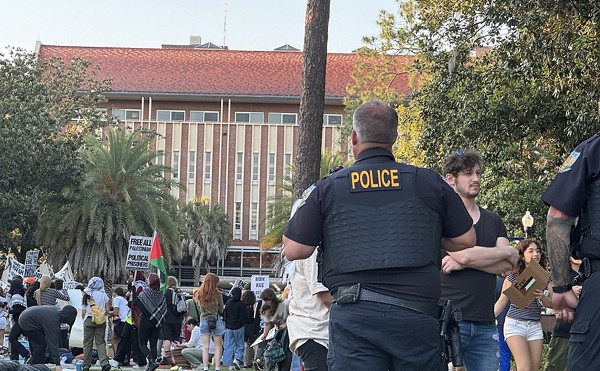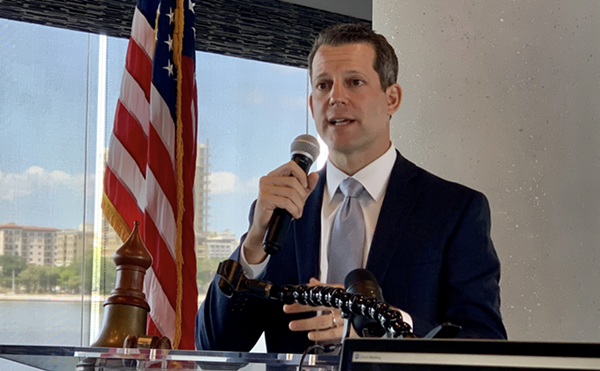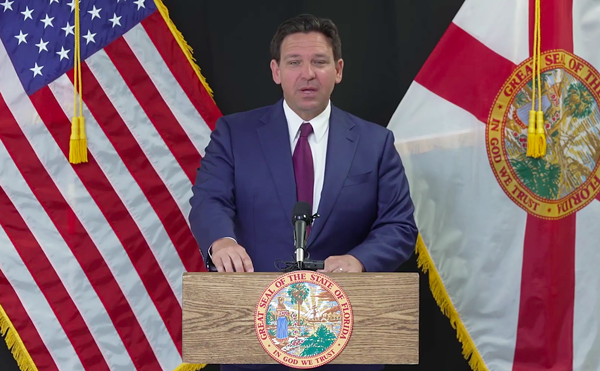[image-1]
Some aspects of the story seem a bit confused, particularly where it concerns interfacing with The System. Linda’s story took me several days to figure out. When I finally did figure it out, I went back to the sidewalk outside the Open Air Post Office, equipped with this new information, to share it with her. The results are published in Part Two of this piece. Part One is her story, as she dictated it to me.
When Linda Mariano talks, I can tell that she’s hearing impaired. She tells me she’s 57 years old and 95 percent deaf, says she has the paperwork to prove it. Both of her parents are deceased. Growing up in Tennessee, she was in special education classes all through school, which she didn’t finish. Her teachers told her she had the intellectual capacity of a third grader and, “That’s pretty bad when you come to my age.” She’s never held down a job because she can’t learn quickly enough to keep one. When she was seventeen (“or eighteen”), she was hit in the head with a brick and lost a piece of her skull. I feel the spot on her head where the silver-dollar-sized piece of skull is missing.
SG: Does that hurt?
LM: Not now it don’t.
SG: Why didn’t you get a plate over it?
LM: Well, I was supposed to, but the guy that did it was still in town, so I was afraid to go back.
Linda says she has memory lapses that often make her forget things. It makes keeping a job very hard, she says.
She's been married two times and has three children. She hasn’t seen her sons since they were babies. Their father prevented her from doing so, she says: “I can’t write them, I can’t call them, I can’t have no kind of contact with them at all. Because the fact is that my ex-husband kind of slandered my name, made me look like a tramp or something, like I don’t want to have nothing to do with the boys, so the boys don’t want to have nothing to do with me, either. So, I just let them live their life, I live my life.”
She was never married to Felicia’s father. They separated before she was born. Ever since then, Linda says, “It’s just been me and her.” Now she’s twenty-one and lives in Clearwater. They talk every chance they get, but Felicia can’t help her get off the streets because, “She’s having a time of it, herself.” She’s in school for something to do with administration, but Linda doesn’t know exactly what kind of administration. Linda says she likes it, though: “She’s not the kind that just, you know, sits back and lets mom take care of her. She likes to work.”
Felicia has two children, a boy and a girl: one three years old, the other fifteen months. “She’s the kind of mother that worries about them,” Linda says, “I was that way when she was little, too.” The children’s father is in jail, and is getting out in March. For a while, Felicia was struggling without someone to watch the kids. Linda couldn’t get all the way up to Clearwater every day to help her.
She and her daughter moved down to Florida with Linda’s sister when Felicia was nine (“or ten”). They were shuffled back and forth between her sister’s and her niece’s houses for the next four or five years, until Linda and her sister had an argument and her sister kicked her out of the house.
Some parts of the story are blurry. For instance, it’s unclear whether she and Felicia had an apartment for any amount of time after that. At some point, though, Felicia’s father stopped paying child support and they lost an apartment. Whether that happened after being kicked out of her sister’s house or not doesn’t really matter, though. What matters is that when Felicia was fourteen, they became homeless. Felicia went to live with friends. Linda went out on the streets.
[image-2]“[Felicia] worries about me being out here,” Linda says, “but she knows this is what I want, that I’m happy—well, actually, I’m not happy—but I’m happy with him, but I’m not happy being out here. We’re making it the best way we can.”
She met Bobby in Williams Park shortly after getting out on the streets: “We started hanging out and got really acquainted and socialized and then all the sudden he fell in love and then a month later I fell in love,” she says, “I had to wait, you know, with my time because I can’t just push myself into something…without really knowing what it’s gonna be because I did that much before and I ended up in bad relationships.”
They sleep on the sidewalk outside the Open Air Post Office, keeping their wagon next to them at all times. Bobby says he only gets two or three hours of sleep a night because he stays awake to take care of Linda. Linda gets to sleep when she can manage it. She says sleeping on the sidewalk isn’t always easy, though, “The fact is that sometimes I don’t sleep well because I got the arthritis and it bothers me, it keeps me tossing and turning. So I just don’t sleep well sometimes.” Bobby keeps three knives hidden by their makeshift bed: one at the head, one at the feet, and another next to the wagon. He says all his knives are legal, so the cops can’t take them away.
Bobby is also disabled. In 1979, he says, he crashed his Harley Davidson at 120 mph and had to have his right shoulder, hip and knee replaced. He can work, he says, but most of his experience is in fast food, and he's already applied at every McDonald's in the area: “I’ve applied everywhere,” he says, "You know it's bad when you can't get a job at McDonald's."
Linda was getting Medicaid when she had Felicia in the house, but she lost it when they parted. She’s reapplied three times, she says, and been turned down each time. “That don’t even make no sense,” she says, “I’m fifty-seven years old and still can’t get Medicaid. I can’t get nothing done. Can’t get my ears checked on, can’t get my eyes checked on, or teeth or nothing because they won’t give me my Medicaid. I got Pyorrhea in my mouth, it’s breaking every one of my teeth. My teeth are rotting out and breaking, and I can’t get them fixed because the fact is that I can’t get Medicaid.”
She’s tried to get rent vouchers and been turned down. She applied for Supplemental Security Income (SSI)—turned down. She took those results to Gulfcoast Legal Services to be appealed, but will have to wait eighteen months for it to go to court because Gulfcoast is, “like a year and a half behind.”
She tells me she went to the health department to get a doctor, but was told that she couldn’t have a doctor because she didn’t have a residence. She says they told her she can have something she calls “Home Medical”, but she doesn’t know how she can possibly do that because, as Bobby says, “What am I gonna do, call them up and tell them to meet me on the corner?”
When Linda gets sick, she goes to the emergency room. It’s been ten years since she paid a doctor’s bill, she says. She can’t even tell me what her total hospital bills are at this point, only that she has, “a great deal.” She just got one in the mail a couple of weeks ago for $1,000.
“And I was thinking to myself, ‘How am I going to pay that?’ I have no money. And the money I do make, I gotta survive on it, so I can’t pay [hospital bills]—and they won’t give me no Medicaid. I get food stamps, but I don’t get Medicaid.”
I explain that I'm a reporter, that I want to write a story about them. "Thank you," they say, smiling broadly, "Please help us." I take their pictures and show them. They laugh. We hug and say goodbye. I tell them where to read the story when it's finished. As I'm walking away, Linda points at the sky.
"Is that the moon?" she asks. Bobby says yes.
I told Linda I'd come back in a few days to ask her some more questions. In the meantime, I did some research. More on that in Part Two.














